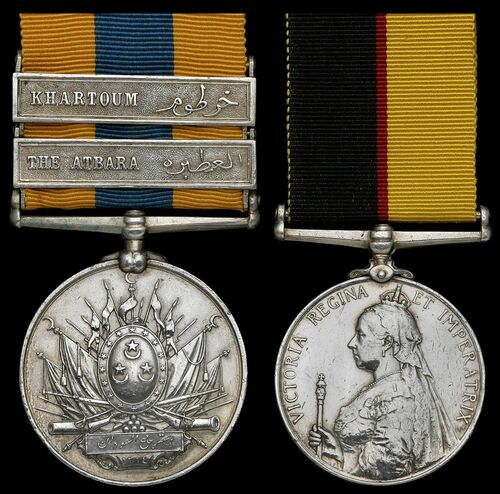
Auction: 23112 - Orders, Decorations and Medals - e-Auction
Lot: 388
Pair: Lance Corporal J. Leen 1st Battalion, Lincolnshire Regiment
Queen's South Africa 1896-98, no clasp (4086. L/Cpl. J. Lee. 1/Lin: R.); Khedive's Sudan Medal 1896-1908, 2 clasps, The Atbara, Khartoum (4086 L. Cpl. J. Lee. 1st Linc. R.), contact marks, minor edge wear to first, overall nearly very fine (2)
Joseph Lee was born at Spalding, Lincolnshire in 1876 and lived at 60 Commercial Road, Spalding before attesting on 29 January 1895. Serving with the 2nd Battalion in Britain for several months he later joined the 1st Battalion as part of the Malta Garrison. He was to remain there for over a year before joining the British army assembling in Egypt for the long-delayed reconquest of the Sudan on 4 February 1897.
The re-conquest of the Sudan had begun the year earlier with the capture of Dongola and the army had spent much of 1917 extending the Sudan Military Railroad and consolidating in preparation for a knock-out blow the next year. The British Brigade, Major-General Gatacre joined the Egyptian Army in late February 1898, rushed down to the front at Berber by means of the new railroad.
Skirmishes with Baggra horsemen proved indecisive and the enemy army, commanded by the Khedive's nephew Mahmud, was now encamped at Nukhayla. A raid by Egyptian Infantry of the town of Shendi - where Mahmud had left his food and non-combatants - left the Mahdist forces in a poor position. Despite this Kitchener's own supplies were dwindling at an alarming rate and he decided to attack.
Mahmud's Army was camped in a zabara - a thorn fenced enclosure - set within an acacia forest which prevented any attack except from the front. The British Army advanced in a square formation through the night, arriving before the zabara in the early hours of morning and forming into assault columns. The Sudanese Brigades formed the right and centre of the line with the British Brigade on the left.
The Battle started with an intense artillery bombardment intended to hammer the Mahdist Army into submission before the infantry attack. When Kitchener sounded the advance the British line was headed by the Camerons with the Lincolns behind. As they closed with the zabara the dervishes opened fire and tore into the British advance with a heavy fire, despite this they continued to advance stolidly.
They stormed over the zabara into the scene of devastation beyond, for the Anglo-Egyptian guns had done their work well. Despite this the enemy was much in evidence and fought tooth and nail against the wall of bayonets to drive the Sirdar's army back beyond the camp. Worse the entire area was honeycombed with trenches and a second zabara further in the centre in which Mahmud had withdrawn. Khartoum by Micheal Asher refers:
'Once again, it was bayonet against sword and spear. But the quality of the British bayonets had improved in the thirteen years since et-Teb and Tamaai. For long minutes there was a bloody hand-to-hand tussle inside the zariba. The attackers were streaming into it, thousands upon thousands of men, crammed shoulder to shoulder, stabbing, thrusting, firing and gouging.'
In the end the enemy army was totally defeated and hounded from the camp. Mahmud was wounded by a bayonet and taken prisoner although the more dangerous enemy - Osman Dinga - had escaped. This was the only flaw in an otherwise textbook victory, the enemy army ceased to exist as a coherent fighting force and the British advance on Khartoum was open.
Lee remained in Egypt being appointed Corporal on 19 June 1898 before being posted to India on 17 October 1898. Unfortunately, he was soon charged with misconduct and arrested, reduced back to the ranks he returned to duty on 24 December 1899. Agreeing to extended service he remained with the Regiment until his eventual discharge on 28 January 1907; sold together with a typed biography.
Subject to 20% VAT on Buyer’s Premium. For more information please view Terms and Conditions for Buyers.
Sold for
£400
Starting price
£130




